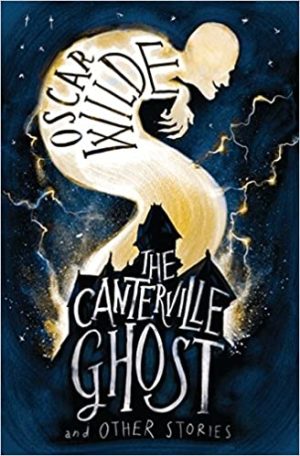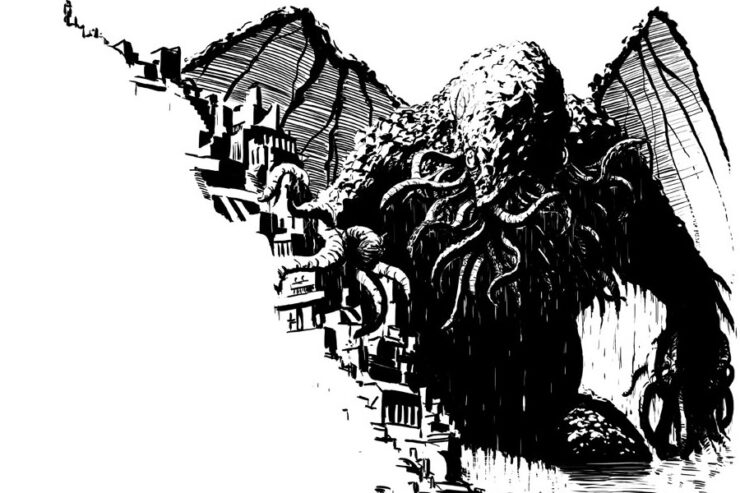Welcome back to Reading the Weird, in which we get girl cooties all over weird fiction, cosmic horror, and Lovecraftiana—from its historical roots through its most recent branches.
This week, we’re reading Oscar Wilde’s “The Canterville Ghost,” first published in the 23 February and 2 March 1887 issues of The Court and Society Review. Spoilers ahead—but read it for yourself first.
“My Lord,” answered the Minister, “I will take the furniture and the ghost at a valuation. I have come from a modern country, where we have everything that money can buy; and with all our spry young fellows painting the Old World red, and carrying off your best actors and prima-donnas, I reckon that if there were such a thing as a ghost in Europe, we’d have it at home in a very short time in one of our public museums, or on the road as a show.”
Lord Canterville is selling Canterville Chase to Hiram Otis, the American Minister, but feels it his duty to admit that the place is haunted. In 1575, Sir Simon murdered his wife Lady Eleanore. Nine years later he disappeared, and now his guilty spirit stalks the Chase.
Otis, unperturbed, says he’ll take the ghost along with the furniture.
The Otises move in. Mrs. Otis is handsome, with a magnificent constitution. Eldest son Washington is groomed for diplomacy. Miss Virginia, fifteen, is a “wonderful amazon” of a horsewoman. The young Duke of Cheshire has already fallen for her. The youngest Otises are twin boys with a penchant for mischief.
Mrs. Umney, the housekeeper, welcomes them and explains (ominously) that a red stain by the library fireplace is Lady Eleanore’s blood, resisting all attempts at removal. Nonsense, declares Washington. He whisks out Pinkerton’s Paragon Detergent and obliterates the stain. Lightning flashes, thunder peals, and Mrs. Umney faints.
Next morning, the bloodstain’s back. That night, Mr. Otis encounters a ghost in the upstairs hall: an old man chain-bound at wrists and ankles, with burning-coal eyes. Otis, annoyed by the clanking chains, advises the ghost to oil them with Tammany Rising Sun Lubricator.
The ghost groans, outraged, until the twins pitch pillows at his head. Sir Simon escapes to his secret chamber. He considers his centuries of success creating terror through such “stage” personae as “Gaunt Gibeon, the Bloodsucker of Bexley Moor.” These Americans are insufferable! He must have revenge.
The bloodstain recurs every morning, inexplicably morphing through all colors of the rainbow. Sir Simon’s infamous demoniac laughter prompts Mrs. Otis to offer him Dr. Dobell’s tincture, sure to cure indigestion. The thwarted ghost keeps to his chamber, plotting new terrors. He’ll appear to each Otis in a different persona devised to freeze their blood. Only Miss Virginia will he spare, for she’s never insulted him.
Sir Simon manifests in a winding sheet, bearing a rusty dagger. In the upstairs hall he encounters–another ghost! It has red-lit eyes and grinning mouth, a shroud like his own, and a placard no doubt proclaiming its sins. Never having met a ghost before, Sir Simon flees. Recovering courage, he finds it slumped against the wall, collapsing to reveal that its head is a hollow turnip, its shroud a bed-curtain. The placard reads: “YE OTIS GHOSTE. Ye Onlie True and Originale Spook…All others are Counterfeite.”
Exhausted, Sir Simon performs only those spectral duties supernatural law requires, gibbering at the oriel window twice a month. He steals the Rising Sun Lubricator to silence his chains. Even so, he’s constantly tripping booby traps set by the twins. He abandons nocturnal expeditions. The arrival of the Duke of Cheshire almost stirs him to action, but his fear of the Otises keeps the Duke safe.
Virginia encounters Sir Simon in the Tapestry Chamber, gazing forlornly out the window. She overcomes her fear and addresses him kindly. He was very wicked in life, she knows, and he has been stealing her paints to renew the library blood-stain, but perhaps he could emigrate to America. There, many would give a fortune for a family ghost!
Sir Simon doubts he’d like America. What he wants is to sleep, impossible for a ghost. Rest can come only if Virginia, loving and pure, weeps with him for his sins and prays with him for his soul. She may see fearful dark shapes, hear wicked whispers, but against her innocence no power of Hell could prevail.
Virginia agrees and is whisked off through the wall.
When Virginia is missed, the Otises search the house and surrounding countryside. The Duke is beside himself. At midnight Virginia steps from a hidden panel, pale but unhurt, holding a little casket. She’s been with the ghost, she explains; her father must come see what remains of him.
Otis and Washington follow her through the hidden panel to Sir Simon’s secret chamber. It’s a prison cell, where a skeleton lies chained, trying to grasp an out-of-reach trencher and ewer. Lady Eleanore’s brothers sought revenge by locking Simon there to starve.
Sir Simon’s remains are laid to rest with solemn ceremony. In the casket he gave Virginia are rich jewels and a ruby necklace. Despite Mr. Otis’s legal protestations, Lord Canterville insists Virginia keep them for the service rendered to his ancestor.
Eventually Virginia marries the Duke of Cheshire. They visit Sir Simon’s grave. The Duke asks Virginia what happened when the ghost whisked her off. Virginia, grave, says she cannot tell. She owes Sir Simon much, for he made her see what Life is, and what Death means, and why Love is stronger than both.
The Duke says she can keep her secret. But won’t she tell their children some day?
Virginia blushes.
What’s Cyclopean: Simon de Canterville, planning his scares, considers that “he might grabble at the counterpane with palsy-twitching fingers.”
The Degenerate Dutch: Otis suggests that the laws of nature are not suspended for the British aristocracy. Lord Canterville “did not quite understand Mr. Otis’s last observation.” Americans do not escape the flip side of this disdain, being prone to marketing snake oil to anyone, living or dead, within earshot, and also to naming their kids after everything in the DC Metro Area except for Maryland.
A band of Romani are blamed by Virginia’s family for her disappearance (Wilde uses the g-word), but prove entirely sympathetic and cooperative in helping search for her.
Weirdbuilding: Wilde plays with any number of gothic tropes and ghostly stereotypes, but also allows for a hint of science, with the ghost “hastily adopting the Fourth dimension of Space as a means of escape” (as one does).
Libronomicon: Simon de Canterville enjoys Longfellow’s poetry, a welcome distraction when his house lacks living residents. In less literary literature, the scandal of Lord Francis Stilton’s fateful card game with the ghost, hushed up by both families, can be found in the third volume of Lord Tattle’s Recollections of the Prince Regent and His Friends.
Madness Takes Its Toll: Simon frightens the Dowager Duchess of Bolton into a fit from which she never really recovers, sends four housemaids into hysterics, turns a rector into a “perfect martyr to nervous disorders,” etc. etc. through a long list of psychological victims. Several die, at their own hands or as a result of shock and fear, in ways I strongly suspect are drawn from romantic poets (possibly including Longfellow).
As Wilde’s going for humor and it’s 1887, he uses a wide variety of terms for mental illness, chosen primarily for their alliterative value, that we… probably would not, in 2020.
Anne’s Commentary
In Shirley Jackson’s Haunting of Hill House, Dr. Montague describes poltergeists as “rock-bottom on the supernatural social scale…merely undirected force.” Then he seems to contradict himself by mentioning “The Canterville Ghost.” His notion is that the American twins were actually a poltergeist phenomenon, which implies their attacks on Sir Simon arise from subconscious impulses, psychokinetically expressed. Nothing seems further from the truth. All the Otises (Virginia to a lesser degree) are staunch Yankee materialists; their contrast with the superstitious British supplies much of the story’s fun. Even after the Otises accept that the ghost is real, their response is materialistic and rational, infuriating Sir Simon. The twins are the most “mechanical” of the family, constantly setting booby-traps for the hapless ghost.
So, sorry, Dr. Montague. I can’t see the American twins as poltergeists. Far from being “mindless” and “undirected,” their acts of force are directed only too pointedly.
More interesting to me is the idea with which Wilde actually plays: What most call the supernatural is better described by the “more scientific term,” the “higher-natural.” If all existing forces and objects and beings constitute Nature in the largest sense, and if ghosts exist, then ghosts cannot function above or beyond natural law–even if it’s natural law of a different sort. Sir Simon may have some “Fourth-Dimensional” tricks for dodging material assaults, but he’s far from invulnerable. Higher-natural laws apparently dictate that ghosts are not “dead” in the same sense as the blissfully departed spirits at peace in the Garden of Death. Sir Simon, for example, can decide not to keep bloodying the library floor, since the low-minded Otises are “quite incapable of appreciating the symbolic value of sensuous phenomena.” However, higher-natural law forbids him to forgo altogether “phantasmic apparition” or “the development of an astral body.”
And alas, apparitions and astral bodies can feel the sting of shot peas and shiver at cold-water drenching. Used to striking fear, they can yet have fear stricken into them–by crass schoolboys, too, more’s the humiliation!
There’s a grand transatlantic tradition of the Old World poking fun at America and America poking fun right back. “The Canterville Ghost” is a prime example of the former, spoofing as it does America’s reliance on mechanical ingenuity of the more gimmicky sort and its love of brand-name nostrums. Irreverent America treats the most sacred traditions of Europe as mere status-conferring novelties, offering to buy family ghosts as easily as family estates! Americans have sensibilities too dull to get proper frissons from “sensuous phenomena” like perpetual bloodstains! American “amazons” (however wonderful) have the nerve to entrance young noblemen away from British brides! Of course they do it with their money, the Buccaneers!
Virginia Otis, not so much, though. She may have money, but she also has high personal and spiritual merits. In a literary tradition more venerable and pervasive than European-American rivalry, she is the innocent who redeems the sinner. The innocent one is usually female, often virginal (here down to the name), too frequently an outright sacrificial lamb. Dr. Montague erred on another thing. It wasn’t the American twins who freed Canterville of its ghost. It was their sister.
Though Wilde doesn’t entirely squelch his inimitable comic genius once Virginia encounters Sir Simon, the story does take a serious turn at this point. Sentimental-serious, sprinkled with too many capitalized Big Concepts, like Love and Death? Arguable, but things get serious nevertheless, and not without genuine sentiment. Without forgetting his sins, we can pity Sir Simon for his centuries of sleepless half-death. We can admire Virginia’s courage and participate in the tension of her family’s frantic search, their relief at her return.
So far so good if (within the sentimental tradition) predictable. Well, so good except for the poetic prophecy that egregiously fails to scan at lines four and six. But that ending at Sir Simon’s grave! That is intriguingly weird, unless I’m reading too much into it. Virginia’s new husband the Duke asks to know what happened between her and the ghost. Virginia gravely replies that she’s told no one and can’t tell him because Secrets Learned About Life and Death and Love. Cecil accepts, but asks if she’ll tell their children one day.
And then comes the story’s last line: “Virginia blushed.” I can’t quite believe Wilde’s only indicating that she’s the typical Victorian-Edwardian bride embarrassed by the mention of kids because they’re engendered by, gasp, sex. Was there something about her rescue of Sir Simon that kids in particular should not hear? I don’t know. I’m not sure I want to imagine.
I’ll close instead with much appreciation to playwright Wilde for styling his ghost as the celebrated actor of such melodramas as “Jonas the Graveless, or the Corpse-Snatcher of Chertsey Barn” and “The Vampire Monk, or the Bloodless Benedictine.” A thespian revenant, great concept, and I’d love to see Sir Simon in any of his roles.
From the safety of a nice box seat, that is.
Ruthanna’s Commentary
Well, Montague has interesting taste in ghost stories, given his profession/obsession. What, precisely, leads someone in the heart of Hill House to bring up not Stoker’s vicious spirits, nor even Bulwer-Lytton’s mesmerist haunts that fall before fearless scientists, but a satire in which the ghost is a figure of laughter and then pity? I don’t want to get into Hill House analysis in a non-Hill-House week, but I spot either hubris, or terror of acknowledging that actually-scary things even exist.
“The Canterville Ghost” was Oscar Wilde’s prose fiction debut, though he already had two books of poetry and a couple of plays under his belt, so was hardly a newcomer to the scene. (Any scene. Wilde was one of those people who defined scenes by his presence.) Theater in particular plays a major role (sorry) in Canterville’s haunting, as Sir Simon, not content with his own bloody history, is exceedingly proud of the set of characters he’s played in his quest to terrify as many people as possible into dreadfully Romantic fates. I suspect it’s this particular style of haunting, not content with one manifestation or indeed with five manifestations, that caused Jackson herself to connect him with Hill House. Simon is a ghost with strategy.
Simon is also a ghost who takes pride in his work, and who’s easily driven to a case of nerves when it doesn’t have the desired effect. Very easily, and I may have shrieked with a little bit of glee when the narrator points out, deadpan, that Simon has of course never seen a ghost before.
Wilde’s satire has a number of targets, and I suspect they’re au courant enough for 1887 that I’m missing many—though I can certainly appreciate the sharp contrast between smugly-traditional British aristocracy and always-selling-something Twain-ish Americans. I’m quite certain that I’m catching at best half the parodies of popular novels. Almost-innocent Virginia is clearly Dickensian, and (based entirely on Jo Walton’s Tooth and Claw and surrounding discussion) I suspect the abrupt turn towards inheritance law at the end is drawn from Trollope.
But it’s the satire of gothic horror that highlights the degree to which such horror hangs on the victim’s reactions. Perhaps that’s on Montague’s mind, too, when he says that ghosts don’t harm people directly. Simon’s had no trouble with this in the past, and his dramatically-titled roles are linked to long list of nervous disorders, hidden marks, and a dramatic breakup with Voltaire. Confronted with the sanguine Otises, though, he flees his genre and retreats to the house’s most obscure corners, leaving only humor in the vacuum thus created.
It’s an interesting contrast with “How Fear Departed From the Long Gallery,” which manages the trick of combining both humor and horror, matter-of-fact householders with genuine danger. While I love the Wilde, its resolving moment of empathy rings less true. To be fair, I think it’s meant to—a play on the “innocence conquers all” ending that was overused in some of the above-mentioned novels, given a half-twist at the end with Virginia’s blush. And that part reminds me of another not-so-horror-soaked parody. Lovecraft’s “Sweet Ermengarde” similarly plays with the tropes of innocence–and similarly points out the fragile dependence of much genre on characters’ willingness to follow their scripts off cliffs.
No following tropes off cliffs for our Americans, though. May I recommend Otis’s Patented Cliché Dispeller and Genre-Savviness Tonic for that?
We’re taking off a couple weeks for the holidays, and wish you all a happy Hanukkah, blessed Yule, insightful Winter Tide, merry Christmas, happy New Year, and a generally bright Great North American Festival To Combat Seasonal Affective Disorder. We’ll be back in January with Chapter 6 of The Haunting of Hill House.
Ruthanna Emrys is the author of the Innsmouth Legacy series, including Winter Tide and Deep Roots. Her short story collection, Imperfect Commentaries, is available from Lethe Press. You can find some of her fiction, weird and otherwise, on Tor.com, most recently “The Word of Flesh and Soul.” Ruthanna is online on Twitter and Patreon, and offline in a mysterious manor house with her large, chaotic household—mostly mammalian—outside Washington DC.
Anne M. Pillsworth’s short story “The Madonna of the Abattoir” appears on Tor.com. Her young adult Mythos novel, Summoned, is available from Tor Teen along with sequel Fathomless. She lives in Edgewood, a Victorian trolley car suburb of Providence, Rhode Island, uncomfortably near Joseph Curwen’s underground laboratory.














